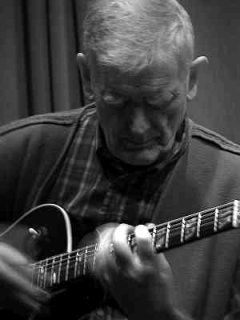Derek Bailey
Derek Bailey is a free improvising avant-garde guitarist. For listeners unfamiliar with experimental music, Bailey’s distinctive style can be initally quite difficult. Its most noticeable feature is what appears to be its extreme discontinuity, often from note to note: there may be enormous intervals between consecutive notes, and rather than aspiring to the consistency of timbre typical of most guitar-playing, Bailey interrupts it as much as possible: four consecutive notes, for instance, may be played on an open string, a fretted string, via harmonics, and using a nonstandard technique such as scraping the string with the pick or plucking below the bridge.
Many of the key features of his music –radical discontinuity, the self-contained brevity of each gesture, an attraction to wide intervals– owe much to Bailey’s early fascination with Anton Webern, an influence most audible on Bailey’s earliest available recordings, Pieces for Guitar (1966-67, issued on Tzadik).
Playing both acoustic and electric guitars (although more usually the former), Bailey is able to extend the possibilities of the instrument in radical ways, obtaining a far wider array of sounds than are usually heard. He explored the full vocabulary of the instrument, producing timbres and tones ranging from the most delicate tinklings to fierce noise attacks. (The sounds he produces have been compared to those made by John Cage’s prepared piano.)
Many of the key features of his music –radical discontinuity, the self-contained brevity of each gesture, an attraction to wide intervals– owe much to Bailey’s early fascination with Anton Webern, an influence most audible on Bailey’s earliest available recordings, Pieces for Guitar (1966-67, issued on Tzadik).
Playing both acoustic and electric guitars (although more usually the former), Bailey is able to extend the possibilities of the instrument in radical ways, obtaining a far wider array of sounds than are usually heard. He explored the full vocabulary of the instrument, producing timbres and tones ranging from the most delicate tinklings to fierce noise attacks. (The sounds he produces have been compared to those made by John Cage’s prepared piano.)
